Moon of Alabama.....
http://rt.com/op-edge/190784-isis-un-threat-obama-coalition/
http://vineyardsaker.blogspot.com/2014/09/iraq-sitrep-update-26th-september-enemy.html
***
24th Sep: The US led coalition starts to bomb Daash positions on the outskirts of Kobani in Northern Syria.
24th Sep: Kurdish forces warn of the fleeing of Daash fighters from Syria to Iraq and ask the US led coalition to bomb Daash convoys entering Iraq.
24th Sep: Iraqi Security Forces and Peshmergas work in coordination in Qara Tapa, north east of Baqouba, Diyala to clear villages of Daash presence
24th Sep: Hassan Nasrallah states that he is opposed to the US led coalition that is bombing Daash. He stated that the Hezbollah fought the "infidel" Daash and will continues to do so, but referred to the US as the "mother of terrorism"
24th Sep: German ammunition, anti tank weapons and assault rifles arrive in Iraqi Kurdistan
24th Sep: An Algerian terrorist group with links to Daash beheads French hiker Herve Gourdel after the Afrench Government refuses to stop its participation in the coalition of the willing.
25th Sep: Rouhani blames the West and it's allies (certain intelligence agencies: CIA) of creating Daash, refers to it as a global threat and asks the west to stop supporting dictators.
25th Sep: Two bombings in Baghdad leave 6 dead and 18 wounded
25th Sep: France confirms that it has carried out its first airstrikes on Daash positions in Iraq. The UK is expected to join the coalition of the willing soon.
25th Sep: The UAE claims that its woman pilot, Mariam Al -Mansouri, took part in its raid on Daash positions. Daash vows revenge.
25th Sep: Kurdish forces in Syria repel an assault on Kobani.
25th Sep: Jassim Mohammed Hassan al-Attiyah of the Salah al Din provincial council states that over 13000 US troops are expected at the Speicher Military Base. This is contrary to what Obama has stated, what Prime Minister Abadi has asked for, and what Sadr and Sistani have clearly opposed.
25th Sep: Daash blows up the historic Al Arbain mosque in Tikrit.
26th Sep: Bombing of Daash positions to the North and to the West of Mosul: Sinjar and Zammar has continued for three days ands ongoing. The "coalition of the willing" is bombing the monster it helped create.
26th Sep: Iranian expert refers to US assault on Daash as America's plan B: http://www.almanar.com.lb/english/adetails.php?fromval=2&cid=19&frid=21&seccatid=19&eid=172896
****
Anti War .....
9/26 items
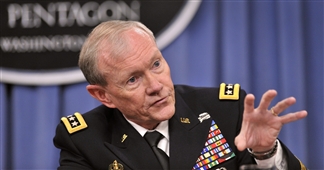 President Obama has repeatedly ruled out ground troops, but Dempsey insists he was ordered to provide recommendations on the destruction of ISIS, and says heknows that requires a large ground force to make it happen.
President Obama has repeatedly ruled out ground troops, but Dempsey insists he was ordered to provide recommendations on the destruction of ISIS, and says heknows that requires a large ground force to make it happen.
 Even though the US couched the initial attacks in Iraq as a “humanitarian intervention,” their focus has since expanded to a full scale war to “destroy” ISIS, in which officials have promised to keep civilian casualties to a minimum, but didn’t appear overly concerned about the deaths in the strikes so far.
Even though the US couched the initial attacks in Iraq as a “humanitarian intervention,” their focus has since expanded to a full scale war to “destroy” ISIS, in which officials have promised to keep civilian casualties to a minimum, but didn’t appear overly concerned about the deaths in the strikes so far.
 It’s puzzling for people in Syria, especially those affiliated with the rebellion, because none of them have ever heard of any such faction. Indeed, the evidence is increasingly that the US made it up.
It’s puzzling for people in Syria, especially those affiliated with the rebellion, because none of them have ever heard of any such faction. Indeed, the evidence is increasingly that the US made it up.
 The idea is particularly puzzling in the northeast, since the US and its allies have been bombing ISIS targets in the exact same region. Since the US air war began, the Assad military has shifted its focus to the northwest, where other rebel factions are, allowing the US to do its dirty work for them.
The idea is particularly puzzling in the northeast, since the US and its allies have been bombing ISIS targets in the exact same region. Since the US air war began, the Assad military has shifted its focus to the northwest, where other rebel factions are, allowing the US to do its dirty work for them.
 Since President Obama announced his intention to strike Syria on September 10, ISIS has gained more than 200 new fighters in Aleppo Province alone. That’s likely a drop in the bucket compared to what it did for recruitment in provinces where they have a larger presence.
Since President Obama announced his intention to strike Syria on September 10, ISIS has gained more than 200 new fighters in Aleppo Province alone. That’s likely a drop in the bucket compared to what it did for recruitment in provinces where they have a larger presence.
 The term Khorasan was basically a US invention, and what is being attacked in that case is Jabhat al-Nusra, an al-Qaeda affiliate. The US strikes are pushing Nusra to forge new ties with ISIS.
The term Khorasan was basically a US invention, and what is being attacked in that case is Jabhat al-Nusra, an al-Qaeda affiliate. The US strikes are pushing Nusra to forge new ties with ISIS.
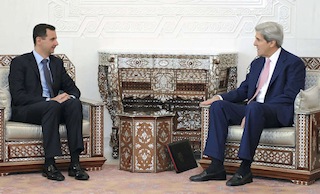 The attacks reflect a reality that the administration has sought not to publicly acknowledge: that an attack on the largest Syrian rebel faction must inevitably be beneficial to the Syrian government they’re rebelling against.
The attacks reflect a reality that the administration has sought not to publicly acknowledge: that an attack on the largest Syrian rebel faction must inevitably be beneficial to the Syrian government they’re rebelling against.
Anti War .....
9/25 items...
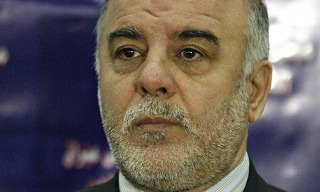 Abadi claimed an attack was “imminent” and that Iraqi intelligence had uncovered it and that he forwarded the intelligence to US officials. That may have been the biggest mistake in his phony narrative.
Abadi claimed an attack was “imminent” and that Iraqi intelligence had uncovered it and that he forwarded the intelligence to US officials. That may have been the biggest mistake in his phony narrative.
 Rebels factions have beencomplaining about the US attacking their “allies” in al-Qaeda, and today warned that the US strikes against ISIS aren’t really helping them in any way either.
Rebels factions have beencomplaining about the US attacking their “allies” in al-Qaeda, and today warned that the US strikes against ISIS aren’t really helping them in any way either.
 Today, the Pentagon has warned that the airstrikes in Syria are going to end up the exact same way, with ISIS expected to quickly change tactics and adapt, making it more difficult to pick out targets.
Today, the Pentagon has warned that the airstrikes in Syria are going to end up the exact same way, with ISIS expected to quickly change tactics and adapt, making it more difficult to pick out targets.
 The Syria strikes indeed put coverage of Iraq on the back-burners, but the escalations of that war have continued, with Fort Riley today announcing over 200 troops from the 1st Infantry Division will be heading to Iraq, operating out of both Baghdad and Arbil.
The Syria strikes indeed put coverage of Iraq on the back-burners, but the escalations of that war have continued, with Fort Riley today announcing over 200 troops from the 1st Infantry Division will be heading to Iraq, operating out of both Baghdad and Arbil.
George Galloway takes on Jacqui Smith .....
#InformedComment Can Iraq Convince its Sunnis to Fight Extremists?: By Mustafa Habib | Baghdad via Niqash.... http://bit.ly/1mwKOca #ME
September 27, 2014
A "Responsibility To Protect" Mercenaries?
From a recent Senate Committee on Armed Services hearing on Iraq and Syria picked up by Micah Zenko:
SEN. JOHN MCCAIN (R-AZ): I take it from your answer that we are now recruiting these young men to go and fight in Syria against ISIL, but if they’re attacked by Bashar Assad, we’re not gonna help them ?
SECRETARY OF DEFENSE CHUCK HAGEL: They will defend themselves, Senator.
MCCAIN: Will we help them against Assad’s air…
HAGEL: We will help them and we will support them, as we have trained them.
MCCAIN: How will we help them—will we repel Bashar Assad’s air assets that will be attacking them ?
HAGEL: Any attack on those that we have trained and who are supporting us, we will help ‘em.
The Pentagon confirmed to Zenko that Hagel meant what he said.
But what does this really mean? One hires a bunch of young fanatics, trains them to kill and sends them to fight some foreign government. Then, when that foreign government dares to defend itself against the mercenary goons, one has a "Responsibility To Protect" them? What a sorry illegal excuse for waging a war of aggression.
There is more of such nonsense coming up again. New talk of a "no-fly zone" as the U.S. is somehow the only one allowed to bomb civilians in Iraq and Syria and also new talk of some kind of buffer zone along the Turkish border.
I don't believe that any of these things will happen. Syria and its allies do have the means to block any legal justification for such issues and they have the means to deter against their implementation.
The policy the Obama administration is trying to implement now is too contradictory and not sustainable. It wants to destroy the ideological fighters of the Islamic State with the support of the states, Saudi Arabia and Qatar, which are based on the same ideology the IS fighters espouse and in which significant parts of the populations support the Islamic State. Obama wants recruit Turkey while the Islamic State is fighting against the Kurd paramilitaries from the PKK/YPK. Turkey its elf has for decades fought against the PKK and the struggle has cost tens of thousands of death. It is also supportive of the Islamic State and similar movements in Syria.
The U.S. wants to bomb the IS in support of the "moderate rebels" who are protesting against such bombing:
The protesters singled out the reported deaths of a dozen or so civilians in the town of Kafr Daryan in northern Idlib province, where a U.S. cruise missile allegedly struck a building that housed displaced people near a base belonging to al Qaida’s Nusra Front.
These "moderate rebels" will now likely put themselves under the command of the Islamic State.
This policy and the lunatic alliances it is based on will break apart. Has there ever been a coalition with such discrepancies that has held throughout the ups and downs of a war? I do not know where, when and how the breaking up will occur but such a mess is simply not sustainable.
That is why I believe that Hagel's "R2P for mercenaries" is just nonsense and something that will never be implemented.
Posted by b on September 27, 2014 at 11:34 AM | Permalink
‘US funded and trained jihadists in Syria – and now it wants to fight them’
Published time: September 26, 2014 11:02
The US is creating in Syria a perpetual state of war, funding jihadists on one side and then attacking them on the other, while the civilian casualties are just a part of the game, investigative reporter Ben Swann told RT.
RT: Washington says that the strikes are being carried out so that the oil facilities remain largely intact and can possibly be used again in the future. Given the weapons and missiles that are being used in this campaign, how likely is that?
Ben Swann: I think it is very difficult, and I think most viewers would agree, it is very difficult to target anything precisely through airstrikes. We refer to drone strikes as signature strikes and we know that drones wipe out a square block of space. So it is not a very definite signature. Look, whenever we talk about airstrikes we're talking about very large plots of land and very imprecise strikes. I think it would be extremely difficult for the US to be able to preserve oil fields while striking.
RT: The refineries that have been hit are now controlled by Islamic State. What is the impact of these attacks in the long run? Are the destroyed refineries much of a blow to the nation's economy?
BS: In the long term, it is going to have a very strong effect. I heard someone said yesterday that the administration should just come out and say what they are trying to do, which is go ahead and launch the strikes against Assad as well because that is what they are really there for. What I think is fascinating about this kind of geopolitical battle here is that the US has neither sought nor received approval, along with coalition partners to be in Syria conducting these strikes right now. It is a really fascinating kind of situation when you consider the [US] president stood up in front of the UN General Assembly yesterday and he talked about the importance of the rogue states not being able to just run roughshod over others and use the term “might” does not equal “right.” Well, I think in this case “might”is trying to make “right” for this coalition of partners and the US simply going into Syria and deciding they will conduct whatever war operations they choose to perform without even seeking the consent of the government.
RT:The Pentagon says that targeting oil facilities is the top priority right now, meanwhile, because of the recent Islamist militants’ advances we saw another wave of refugees and a number of villages seized. How come the protection of civilians comes second for the US?
BS: It really does not surprise me at all. The US, and there is plenty on the record to demonstrate on the record that the US, Turkey, Saudi Arabia and Qatar have all been financing these rebel forces that have then been turning and defecting to ISIS. And they have been doing this in Syria for about three years, over the last year we have seen a large number of defections to ISIS. That statement, the quote from the Iranian president, I think rings true that the US should at least acknowledge its role in this, having done this. So as a result of that and if we're not going to be honest who has funded these groups, how they've received their weapons and the fact that our president wants to continue to fight ISIS in Iraq and in Syria, but give additional money and weapons to the tune of $500 million, according to the US Congress, to the Free Syrian Army, we are creating a perpetual state of war. We'll fund them on one side and then we'll attack them on the other. And the truth is that civilian casualties are just a part of the game at this point.
RT: America is striking oil refineries controlled by Islamic State only in Syria, but the group also controls oil fields in Iraq. Why are those facilities not being targeted by Washington now?
BS: That is a great point. In fact, the numbers that come up show that the Islamic State is worth about $2 billion right now. Those estimates do not come from the oil fields that they control in Syria because right now those are sort of useless to them as well, because of the ongoing battle with the Syrian government. Instead, when you talk about those numbers, it is Iraq's Mosul oil fields that are being deemed as being valuable property to the Islamic State – and as you pointed out a minute ago, the US is not [planning] heavy air strikes on those northern Iraqi oil fields. Why that is? I think we can all speculate, but at this point it will be just speculation.
RT: Earlier, the UN unanimously passed a binding resolution to halt the flow of foreign jihadists to Syria and Iraq. What could be the next step from the international community?
BS: Well again, look, this is why this story is so difficult to talk about, because when we talk about the flow of money, when we talk about the flow of people, there are enormous numbers of people in the US, I would say millions of them who are fed up with the idea that the US government is sending fighters and money to train these rebels who are then turning and becoming ISIS fighters. Why are we going to create essentially sanctions against any country that sends fighters when we ourselves have been funding and supplying fighters? Senator Ron Paul has talked about it a bit in the US; that the US needs to step back and acknowledge the fact that we have funded these groups and given them the technological capability, money and fighters to be able to become the Islamic State. How are we going to create sanctions against other countries that would be sending fighters? It is upside-down when we talk about this issue.
http://vineyardsaker.blogspot.com/2014/09/iraq-sitrep-update-26th-september-enemy.html
***
24th Sep: The US led coalition starts to bomb Daash positions on the outskirts of Kobani in Northern Syria.
24th Sep: Kurdish forces warn of the fleeing of Daash fighters from Syria to Iraq and ask the US led coalition to bomb Daash convoys entering Iraq.
24th Sep: Iraqi Security Forces and Peshmergas work in coordination in Qara Tapa, north east of Baqouba, Diyala to clear villages of Daash presence
24th Sep: Hassan Nasrallah states that he is opposed to the US led coalition that is bombing Daash. He stated that the Hezbollah fought the "infidel" Daash and will continues to do so, but referred to the US as the "mother of terrorism"
24th Sep: German ammunition, anti tank weapons and assault rifles arrive in Iraqi Kurdistan
24th Sep: An Algerian terrorist group with links to Daash beheads French hiker Herve Gourdel after the Afrench Government refuses to stop its participation in the coalition of the willing.
25th Sep: Rouhani blames the West and it's allies (certain intelligence agencies: CIA) of creating Daash, refers to it as a global threat and asks the west to stop supporting dictators.
25th Sep: Two bombings in Baghdad leave 6 dead and 18 wounded
25th Sep: France confirms that it has carried out its first airstrikes on Daash positions in Iraq. The UK is expected to join the coalition of the willing soon.
25th Sep: The UAE claims that its woman pilot, Mariam Al -Mansouri, took part in its raid on Daash positions. Daash vows revenge.
25th Sep: Kurdish forces in Syria repel an assault on Kobani.
25th Sep: Jassim Mohammed Hassan al-Attiyah of the Salah al Din provincial council states that over 13000 US troops are expected at the Speicher Military Base. This is contrary to what Obama has stated, what Prime Minister Abadi has asked for, and what Sadr and Sistani have clearly opposed.
25th Sep: Daash blows up the historic Al Arbain mosque in Tikrit.
26th Sep: Bombing of Daash positions to the North and to the West of Mosul: Sinjar and Zammar has continued for three days ands ongoing. The "coalition of the willing" is bombing the monster it helped create.
26th Sep: Iranian expert refers to US assault on Daash as America's plan B: http://www.almanar.com.lb/english/adetails.php?fromval=2&cid=19&frid=21&seccatid=19&eid=172896
****
Anti War .....
9/26 items
Dempsey on Ground Troops: Whatever It Takes
Says 'Ideal' Ground Force Wouldn't Involve Americans
by Jason Ditz, September 26, 2014
Joint Chiefs of Staff Chairman General Martin Dempsey refused to back down from last week’s comments on the possibility of US ground troops being involved in the open-ended war on ISIS, insisting today that he will recommend “what it takes” to destroy ISIS, even if that means ground troops.
 President Obama has repeatedly ruled out ground troops, but Dempsey insists he was ordered to provide recommendations on the destruction of ISIS, and says heknows that requires a large ground force to make it happen.
President Obama has repeatedly ruled out ground troops, but Dempsey insists he was ordered to provide recommendations on the destruction of ISIS, and says heknows that requires a large ground force to make it happen.
Dempsey tried to be a bit conciliatory about the disconnect with the president, insisting that the “ideal” force wouldn’t include Americans, but would rather include Iraqis, Kurds, and Syrian “moderates.”
The general appeared to be expanding expectations for the Syrian rebel factions being trained by the Pentagon, saying the estimates are that they will need 12,000 to 15,000 fighters in eastern Syria. The plan approved by Congress aims to create a force of 5,000 within a year.
Red Cross: US Strikes Add to Humanitarian Crisis in Iraq, Syria
Strikes Compounding the Humanitarian Conflict
by Jason Ditz, September 26, 2014
The International Committee of the Red Cross (ICRC) has warned that the US-led airstrikes against ISIS in Iraq and Syria have “compounded the humanitarian consequences of the conflicts in both countries.”
 Even though the US couched the initial attacks in Iraq as a “humanitarian intervention,” their focus has since expanded to a full scale war to “destroy” ISIS, in which officials have promised to keep civilian casualties to a minimum, but didn’t appear overly concerned about the deaths in the strikes so far.
Even though the US couched the initial attacks in Iraq as a “humanitarian intervention,” their focus has since expanded to a full scale war to “destroy” ISIS, in which officials have promised to keep civilian casualties to a minimum, but didn’t appear overly concerned about the deaths in the strikes so far.
The Red Cross warns that the situation is continuing to worsen, and warned that all the combatant factions must refrain from harming civilians and must allow humanitarian workers to bring help.
As US strikes have increased, ISIS has moved most of its forces to less conspicuous targets that are less convenient to hit. This has made the US more likely to go after difficult targets, particularly those in populated areas, which means the humanitarian woes of the conflict are likely to grow as the war continues.
Khorasan: Syrian Factions Never Heard of It
Term Likely Invented by US
by Jason Ditz, September 26, 2014
Since the US began its airstrikes against Syria, the name Khorasan has been on everyone’s lips since, along with ISIS, they’ve become a top target.
 It’s puzzling for people in Syria, especially those affiliated with the rebellion, because none of them have ever heard of any such faction. Indeed, the evidence is increasingly that the US made it up.
It’s puzzling for people in Syria, especially those affiliated with the rebellion, because none of them have ever heard of any such faction. Indeed, the evidence is increasingly that the US made it up.
“The name is clearly US-originated,” noted analyst Pieter van Ostaeyen, who says that the name had never been mentioned by any jihadist movements until the US started talking them up.
Rather, what is being referred to by the administration as Khorasan is simply al-Qaeda. When the US attacks “Khorasan” they’re really attacking Jabhat al-Nusra, al-Qaeda’s Syria group, and don’t want to admit it because the “moderate” rebels are all closely allied with al-Qaeda. But they aren’t allied with Khorasan because there is no such thing.
The name is also a political convenience, so that when the TSA says the “Khorasan” isa threat to US flights, what they’re really saying is that al-Qaeda is a threat to US flights, hardly news, but a damning admission that 13 years of focusing on al-Qaeda in a global war hasn’t amounted to a hill of beans, and the threat is still there.
They don’t want to admit that, so instead they invented the fiction of Khorasan to cover up the truth.
Pentagon: US Considers ‘No-Fly’ Zone Against Assad in Syria
Dempsey: Buffer Zone Might Also Be Possibility
by Jason Ditz, September 26, 2014
Secretary of Defense Chuck Hagel and Joint Chiefs of Staff Chairman Gen. Martin Dempsey say that the US is still considering the possibility of establishing a “no-fly zone” over northeastern Syria to deny the Syrian military the ability to launch airstrikes against the rebels therein.
 The idea is particularly puzzling in the northeast, since the US and its allies have been bombing ISIS targets in the exact same region. Since the US air war began, the Assad military has shifted its focus to the northwest, where other rebel factions are, allowing the US to do its dirty work for them.
The idea is particularly puzzling in the northeast, since the US and its allies have been bombing ISIS targets in the exact same region. Since the US air war began, the Assad military has shifted its focus to the northwest, where other rebel factions are, allowing the US to do its dirty work for them.
Gen. Dempsey also said that they are considering the Turkish proposal for a “buffer zone” carved out of northern Syria to house refugees. Turkey has sought the zone as a way to get rid of the 1.3 million refugees they’ve been saddled with, while waiting for some regime change to happen in Syria.
That such schemes are even under consideration suggests that the Obama Administration haven’t given up on the idea of expanding their new ISIS war to include Syria’s government as well, even though they’re fighting ISIS as well.
US Strikes Boost ISIS Recruitment in Syria’s Aleppo
Over 200 Joined Since Obama Announced Attacks
by Jason Ditz, September 26, 2014
Syrian rebels say that the US airstrikes on ISIS inside Syria haven’t helped them. If you’re wondering who is benefiting, the answer could well be ISIS.
 Since President Obama announced his intention to strike Syria on September 10, ISIS has gained more than 200 new fighters in Aleppo Province alone. That’s likely a drop in the bucket compared to what it did for recruitment in provinces where they have a larger presence.
Since President Obama announced his intention to strike Syria on September 10, ISIS has gained more than 200 new fighters in Aleppo Province alone. That’s likely a drop in the bucket compared to what it did for recruitment in provinces where they have a larger presence.
The US couldn’t be following the ISIS map more closely if they planned it, as the group is building itself up into a larger and more influential faction primarily on the credibility it gets from being a top US enemy right now, moreso than the territory it gained in the past year.
The administration’s answer to ISIS growing increasingly influential has been to hype them even further, and present them as a new, global enemy that needs to be wiped out through force of arms. Unsurprisingly, that has made many of the people in the line of fire of America’s newest war stand up and take notice, and is bringing a lot of them to ISIS, where they can resist the incoming US attacks on their homes.
US Strikes Pushing Syrian al-Qaeda to Join With ISIS
Long Divided, ISIS and Nusra Now Have Common Enemy
by Jason Ditz, September 26, 2014
The US decision to open up its attacks on ISIS in Syria earlier this week came with a decision to attack another faction, which they dubbed Khorasan.
 The term Khorasan was basically a US invention, and what is being attacked in that case is Jabhat al-Nusra, an al-Qaeda affiliate. The US strikes are pushing Nusra to forge new ties with ISIS.
The term Khorasan was basically a US invention, and what is being attacked in that case is Jabhat al-Nusra, an al-Qaeda affiliate. The US strikes are pushing Nusra to forge new ties with ISIS.
ISIS has long been at odds with the other rebel factions, including Nusra, and had been in direct conflict with them off and on. The US insinuation of itself into the war, however, has given both sides a very high-profile common enemy.
Way back when, ISIS (then still al-Qaeda in Iraq) announced a “merger” with al-Nusra, which brought them several recruits, but also split Nusra in half, and fueled a split between ISIS and al-Qaeda in the process. Increasingly, that division seems like it could be wiped out by the US war.
As US Hits East Syria, Assad Steps Up Strikes in West
US Strikes on ISIS Free Up Syrian Military Against Other Rebels
by Jason Ditz, September 26, 2014
The Obama Administration’s attacks on ISIS across Eastern Syria continued apace today, and unsurprisingly, have given way to an increasing number of Syrian military airstrikes in the West.
 The attacks reflect a reality that the administration has sought not to publicly acknowledge: that an attack on the largest Syrian rebel faction must inevitably be beneficial to the Syrian government they’re rebelling against.
The attacks reflect a reality that the administration has sought not to publicly acknowledge: that an attack on the largest Syrian rebel faction must inevitably be beneficial to the Syrian government they’re rebelling against.
The US has had no problem presenting its strikes in Iraq as beneficial to Iraq’s government and the Kurdistan Regional Government (KRG), but doesn’t have the cozy relationship with the Assad government.
Still, even if the US wasn’t coordinating its Syria strikes with Assad (which it is, indirectly, through Iraq), those attacks are going to free up Syrian military assets to focus on other rebel factions. The Syrian military is taking advantage of that in a big way, hitting the western rebel territory in ways that weren’t possible before.
Anti War .....
9/25 items...
Iraqi PM Invents ISIS Subway Plot
US: No Evidence of Any Such Thing
by Jason Ditz, September 25, 2014
When keeping foreign powers involved in a war on your behalf, you have to keep scaring them. Iraqi Prime Minister Hayder Abadi is trying his best, announcing an ISIS “plot” to attack an unspecified American subway, along with the one in Paris.
 Abadi claimed an attack was “imminent” and that Iraqi intelligence had uncovered it and that he forwarded the intelligence to US officials. That may have been the biggest mistake in his phony narrative.
Abadi claimed an attack was “imminent” and that Iraqi intelligence had uncovered it and that he forwarded the intelligence to US officials. That may have been the biggest mistake in his phony narrative.
That’s because US officials say thewhole thing is news to them, and they’ve seen no evidence of any such plot in either the United States or France, and have no credible information to back up the Iraqi premier’s allegations.
Abadi’s claims hit all the right notes, large cities, civilian transit targets with large numbers of potential casualties, etc. The big problem, however, is that the whole thing seems to be hastily made up, and no one is buying it.
‘Moderate’ Syria Rebels: US Airstrikes Haven’t Helped
Factions Push for More Arms, Ammunition
by Jason Ditz, September 25, 2014
The “carefully vetted moderate” Syrian rebels were supposed to be the beneficiaries of the new US air war in Syria. They aren’t seeing it that way.
 Rebels factions have beencomplaining about the US attacking their “allies” in al-Qaeda, and today warned that the US strikes against ISIS aren’t really helping them in any way either.
Rebels factions have beencomplaining about the US attacking their “allies” in al-Qaeda, and today warned that the US strikes against ISIS aren’t really helping them in any way either.
Rebels say the US “offered very little ammunition support, no information, no air cover, and no collaboration in military plans and tactics,” and are once again pushing the US for more arms shipments.
The US has been arming and backing these factions for many months now, but they’ve had limited success because the groups are much smaller than their Islamist rivals, who usually do the heavy lifting in major ground combat. Still, the groups continue to gripe about the US not throwing enough weapons at them, and not further escalating the war on their behalf.
The US war also found considerable complaints from Syrian women activists, who warned the US attacks were counterproductive, killing civilians and radicalizing the population.
Pentagon: ISIS Will Adapt to Airstrikes in Syria
War Depends on 'Competent Partners' on the Ground
by Jason Ditz, September 25, 2014
Six weeks of US airstrikes against ISIS in Iraq didn’t amount to much of a change on the ground, as ISIS quickly adapted and stopped leaving expensive vehicles out in the open where they could get bombed.
 Today, the Pentagon has warned that the airstrikes in Syria are going to end up the exact same way, with ISIS expected to quickly change tactics and adapt, making it more difficult to pick out targets.
Today, the Pentagon has warned that the airstrikes in Syria are going to end up the exact same way, with ISIS expected to quickly change tactics and adapt, making it more difficult to pick out targets.
What damage the strikes have done, Pentagon officials say ISIS will easily rebound from, and picking future targets will require “competent partners” on the ground to spot.
That the US doesn’t have particularly competent partners is western Iraq, let alone in ISIS-held Syria, doesn’t seem to be impacting their ambitions for a long and ever-expanding war. This suggests that despite Pentagon promises to try to limit civilian casualties in the air war, there is little reason for American pilots to have any real clue who they’re dropping bombs on.
With Focus on Syria, US Escalation in Iraq Continues Apace
Over 200 More Troops Headed to Iraq From Fort Riley
by Jason Ditz, September 25, 2014
With all of the attention this week on the US expansion of its ISIS war into Syria, one might expect that the war in Iraq is on the back-burners, simply treading water for the time being. That’s not the case.
 The Syria strikes indeed put coverage of Iraq on the back-burners, but the escalations of that war have continued, with Fort Riley today announcing over 200 troops from the 1st Infantry Division will be heading to Iraq, operating out of both Baghdad and Arbil.
The Syria strikes indeed put coverage of Iraq on the back-burners, but the escalations of that war have continued, with Fort Riley today announcing over 200 troops from the 1st Infantry Division will be heading to Iraq, operating out of both Baghdad and Arbil.
The new deployments are above and beyond the 1,600 US ground already in Iraq, and will only add to speculation that the administration is slowly but surely building up to the ground war that they have repeatedly promised isn’t being considered.
The US has been adding troops to its force in Iraq on a weekly basis, though it seems to be less public about that fact this time, leaving it up to the fort to announce the planned deployments.
George Galloway takes on Jacqui Smith .....
Tweets - 9/27......
How The "Syrian Rebels" Really Feel About US Airstrikes http://www.zerohedge.com/news/2014-09-27/how-syrian-rebels-really-feel-about-us-airstrikes …
Jaish al-Islam spokesman gives “7 Substantive Reasons” for opposition to strikes in #Syria http://justpaste.it/haf5
- Despite intense US and French air activity over the Fallujah-Ramadi corridor, #IS was still able to mass mounted forces, inc/ capture
- ISF at Camp Albu Aytha collapsed after being besieged for a week and two IS assaults. Most of the 150 ISF personnel at the base appear (1/2)
- An important piece - "Airstrikes in #Syria Roil Rebel Alliances" - http://on.wsj.com/ZZqKoL via @WSJ @Gorman_Siobhan @Abihabib
"Warplanes heard overhead" - watch latest report from Kobane in Syria, on border with Turkey http://bbc.in/1uuRt9v
UK purchases 20 Tomahawk missiles ahead of #ISIS operation http://ara.tv/4xmtp
guido olimpio retweeted
#BreamingNews:
#IS initiated an artillery bombardment agianst #Kobane #AynalArab #Syria #Kurds #IslamicState
First US-led airstrikes hit #Kobane http://fb.me/3BtHWdIr0
Antoun Issa retweeted
Good insights into Assad regime thinking on US airstrikes & ISIS, by @antissa http://www.huffingtonpost.com/antoun-issa/assad-unlikely-to-comprom_b_5876140.html …
#US-led airstrikes launch air raid in outskirts of #Kobane, targeting #ISIS strongholds, local activists report http://fb.me/2GqR2bS23
#Yazidi, #Christians and Kakayis Volunteer to Join Peshmerga Forces - #BasNews - http://www.basnews.com/en/News/Details/Yazidi--Christians-and-Kakayis-Volunteer-to-Join-Peshmerga-Forces/35586 …
#UK to Join Airstrikes in Iraq Against IS Militants - #BasNews - http://www.basnews.com/en/News/Details/UK-to-Join-Airstrikes-in-Iraq-Against-IS-Militants/35564 …
A risky tactic, if proven accurate - #Raqqa activists report foreign airstrikes have targeted grain mills in western Deir ez Zour, #Syria.
Despite airstrikes, ISIS continues its push in #Hasakah, #Syria aiming towards Yarubiya crossing w. #Iraq - 3 villages captured overnight.
Mark retweeted
Western-Arabs Coalition airstrikes bombed grain silos and mills in western countryside of Deir ez Zor
http://twitter.com/LccSy/status/515782831822618624?p=v …
#Syria
Hayder al-Khoei retweeted
#Iraq state TV says Ministry of Defense today received third batch of Russian MI-35 helicopters.
Al-Monitor retweeted
Khorasan-Nusra relationship explained: US sees Khorasan as entity within Nusra. Symbiotic relationship. http://on.wsj.com/1rqYghT w/ @Abihabib
Al-Monitor retweeted
No names needed: Obama rebukes Erdogan http://almon.co/2857
Al-Monitor retweeted
Kurdish politician proposes segregating Arabs, Kurds in Iraq http://almon.co/2851
UN Security Council issues subtle warning to Turkey http://almon.co/284x
Joel Wing retweeted
Read our latest #Iraq Situation Report? Find it here: http://iswiraq.blogspot.com/2014/09/iraq-situation-report-september-25-26.html …
Morning / Evening tweets - 9/26 ......
#InformedComment Syria to Afghanistan: US Military Policy hasn’t Solved the Zone of Crisis & may Enlarge ... http://bit.ly/1vlNmuj #ME
WHOA!! The #USA flag burned in #Homs today.. #Syria #ISIS https://www.youtube.com/watch?v=2fDJ25RBU2E … via @RSyrianCivilWar
#Syria A dozen airstrikes against former army bases: #Tabqa airbase, division17 base & governorate building in #Raaqa city center
Militias bulldozing homes & telling Sunnis to leave from Latifiya in Baghdad belts http://www.ft.com/intl/cms/s/0/5f1d44d4-44c7-11e4-9a5a-00144feabdc0.html?siteedition=intl#axzz3ERkgUsVm …
Too early to say definitively, but AQC's response to US airstrikes against #IS and the lack of any response so far from al-Jowlani (1/2)
will likely push many in JaN towards IS, and poss. begin to fragment AQC's hold over its affiliates (2/2).
Acc. to @AmalHanano, a US airstrike today struck a USAID-funded project in #Idlib, wounding 11 civil defence personnel. #Syria
Syria Pulse retweeted
Alexblx retweeted
Important interview with #PKK field commander Cemil Bayik: http://www.al-monitor.com/pulse/originals/2014/09/turkey-pkk-commander-bayik-threatens-resume-war.html# … via @AlMonitor #Turkey #Syria #YPG #Kobane #Rojava
U.S.-led strikes pressure al-Nusra Front to join with ISIS http://english.alarabiya.net/en/perspective/analysis/2014/09/26/U-S-led-strikes-pressure-al-Nusra-Front-to-join-with-ISIS-.html …
‘Indiscriminate’ #Iraqi Air Force Bombings Killing Civilians, Watchdog Says http://fb.me/6N3noEPEo
#US to Build Three Military Bases in Kurdistan Region - #BasNews - http://www.basnews.com/en/News/Details/US-to-Build-Three-Military-Bases-in-Kurdistan-Region/35489 …
Turkey ready to take any suitable measure against ISIS http://bit.ly/1CsL6ok
Yannis Koutsomitis retweeted
Signs out of Syria that American action is causing increased support in places for #IS it's not going to be straightforward.
Hayder al-Khoei retweeted
.@wrightr a July 21 poll of Saudis by al-Hayat on social media found 92% believe ISIS in agreement with teachings of Islam @DavidKirkpatrick
New on MoA: A Too Complicate Game: Obama's Deals With The Saudis And Al-Nusra - http://www.moonofalabama.org/2014/09/a-too-complicate



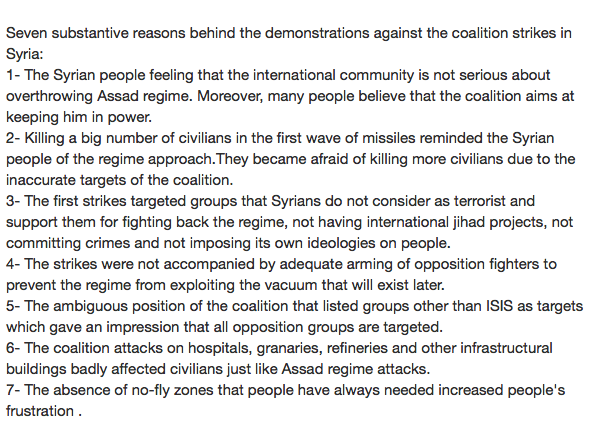
 Memlik Pasha
Memlik Pasha 
 Charles Lister
Charles Lister 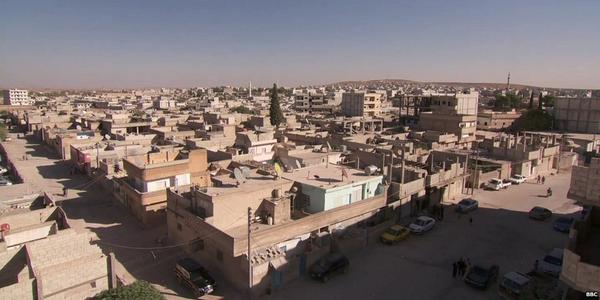

 Rami(ط)
Rami(ط)  Elijah J Magnier
Elijah J Magnier  Rudaw English
Rudaw English 






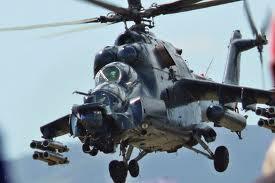





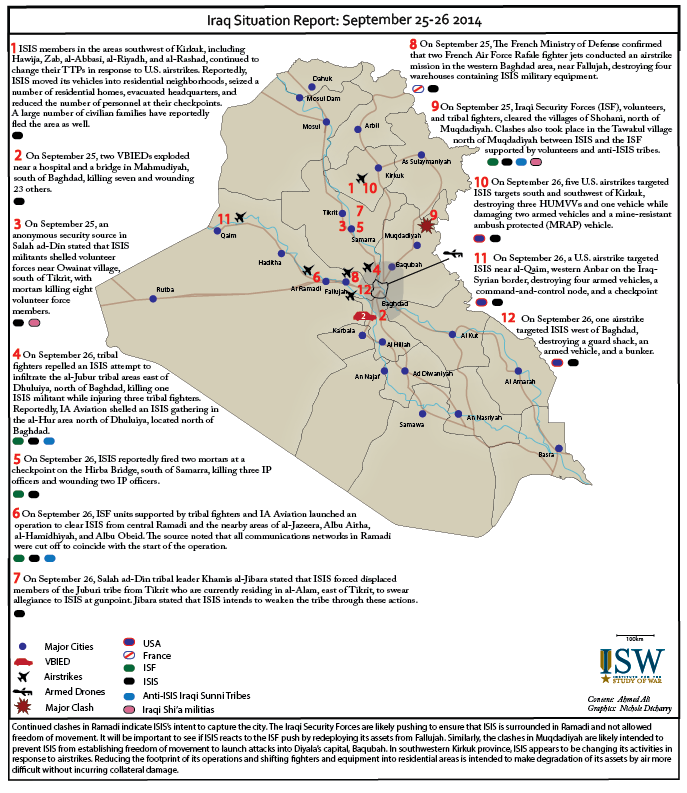






 Edward Dark
Edward Dark 
 Eye on Lebanon&Iraq
Eye on Lebanon&Iraq 




No comments:
Post a Comment